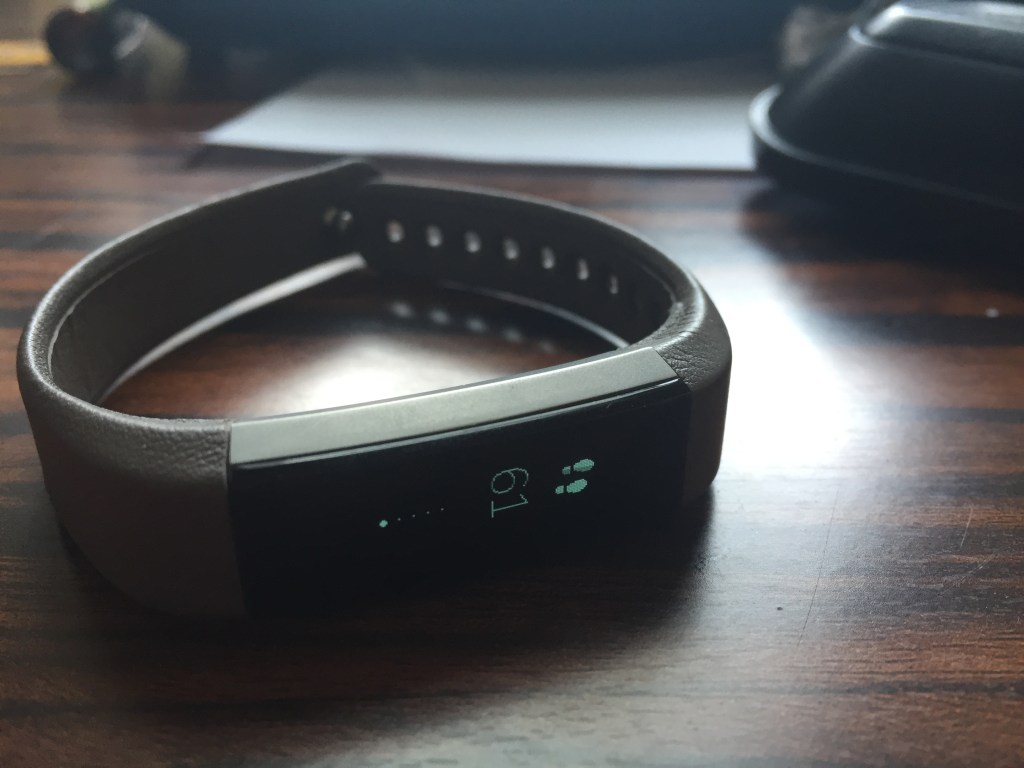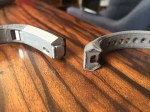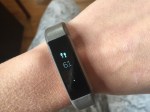For me, fitness trackers are all about motivation. I used to go for a run every single day, and then quit, and then went to yoga every single day, and then I did nothing every single day. Now, a little older and a little more sore, I find myself worried less about working out all the time and more focused on eating healthy and taking enough steps throughout each day.
This can be relatively difficult to monitor without the right combination of hardware and software, and it can be even harder to take those extra 2,000 steps in a day when there happens to be nowhere specific that I need to go.
That said, the Fitbit Alta kept me motivated and moving throughout the time of my review without making me feel like I was wearing sports gear all the time. But that isn’t without a few caveats.
Design
The Fitbit Alta is a relatively unobtrusive little wrist-worn device. It has a long, rectangular screen with easily interchangeable bands. These bands come in plastic (for working out), as well as options in leather and metal.
Notably, the Alta is sleeker and slimmer than any other wrist-worn tracker Fitbit has released thus far. In fact, the metal version might even pass for a regular fashion accessory, depending on who’s looking.
Of course, this makes a lot of sense considering who Fitbit has found itself in the ring with — big brands like Apple and Fossil are also competing in the health tracking space alongside Misfit and Garmin.
The entire industry is looking to give users something they actually want to wear and that doesn’t look like fitness gear. In other words, design is becoming increasingly important in terms of competition and the Alta has succeeded in scoring some fashion points.
Features
The most important feature of the Fitbit Alta is its scratch-resistant OLED display. Thanks to a built-in accelerometer, the Alta automatically shows you the time as soon as you turn your wrist to look at the display.
Of course, this doesn’t work as well as you’d hope. Without a very emphatic twist of the wrist, you’ll be left tapping twice to wake up the Alta.
From there, a single tap on the display lets you run through all your daily stats, including steps taken, distance traveled, calories burned and active time.
To be clear, this isn’t the type of touch display that you see on your iPhone. There is no capacitive touch to let you interact with information on the screen. Instead, it’s simply tap sensitive and you really need to use some gusto in those taps.
The screen is also relatively difficult to see in bright sunlight.
The Alta is splash resistant, which means you shouldn’t worry about little things like washing your hands. Unfortunately, however, you can’t shower or swim with the device.
As you’d expect, the Alta uses Bluetooth to deliver call and text notifications. While this is useful, my main caveat with this feature is that text notifications are cut off after a rather short character limit, making it difficult to understand longer texts. It also switches quickly from one notification to another when someone sends multiple texts, so you end up reading “what do you think?” without knowing what the first and second texts said.
That said, you can’t respond on the Alta itself, so it doesn’t make that big of a difference in the overall quality of the device.
Fitbit has also added software that automatically understands when you’re working out, as opposed to just bopping around with your friends, and tries to log that. You can, of course, go into the app and specify what type of workout you’re doing (from basketball to running) to get more accurate results.
Which brings us to performance.
Performance
The Alta does need a bit of fine-tuning with that display, but the software behind the device is slowly evolving into something far more useful.
While simple data-gathering might have worked for the first-generation devices of the fitness tracking industry, users now need devices that can be proactive in their approach to our health.
One small step toward this is the Alta’s workout reminders. Each hour, the device will buzz and tell you that you need to get up and move.
SmartTrack is another important step, as it knows what you’re doing by your very movements, giving Fitbit more accuracy in tracking your exact stats based on activity.
Moreover, the ability to add a goal weight in the app and track calories eaten gives users a good look into what they need to do, on a daily basis, to achieve their weight goals.
If you burn more calories than you eat, you’re losing weight. Of course, that premise is simple, but the math behind it can be annoying on a daily, or hourly, basis.
Fitbit’s food database contains dishes from a number of popular restaurants and grocery items so you’re getting a good idea of your caloric intake.
But perhaps most importantly, Fitbit’s battery life is right in the sweet spot. The device lasts an entire week (with active sleep tracking) before it needs a charge, letting people settle in to the Alta experience.
The bottom line
The Alta is clearly a step in the right direction for Fitbit, both by way of proactive software and style. But a little tweaking — primarily on the display — could make a big difference in user experience.
$130 is an easy opening price point, though the metal and leather bands will add to that initial cost. Still, I think the Alta is one of Fitbit’s best products yet, and is a great option for the casual athlete.
You can check out the Alta here.



































Comment